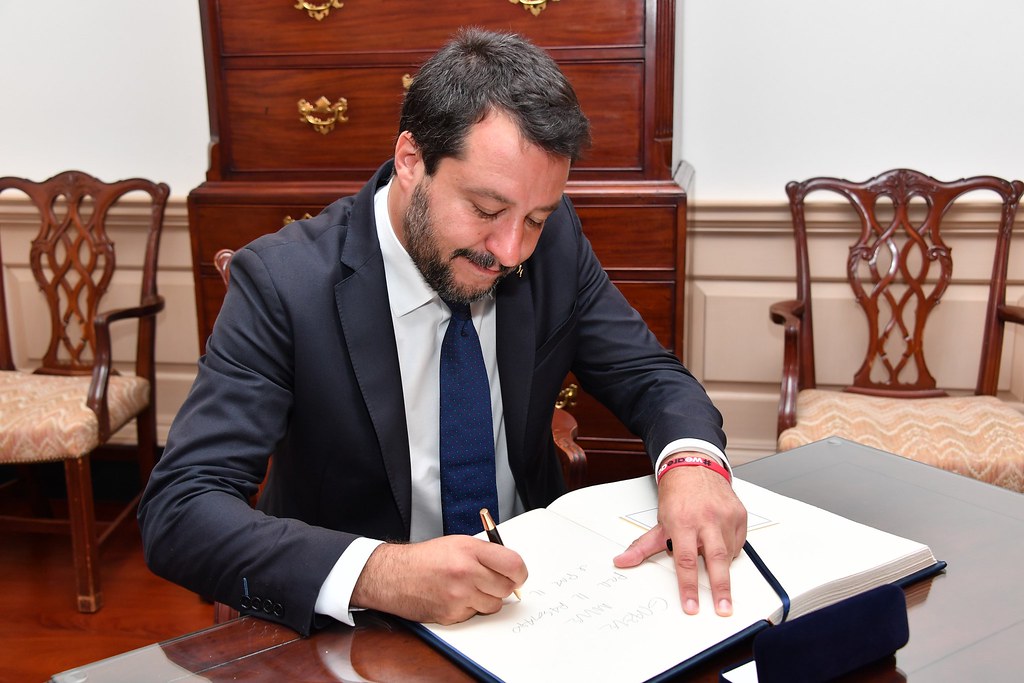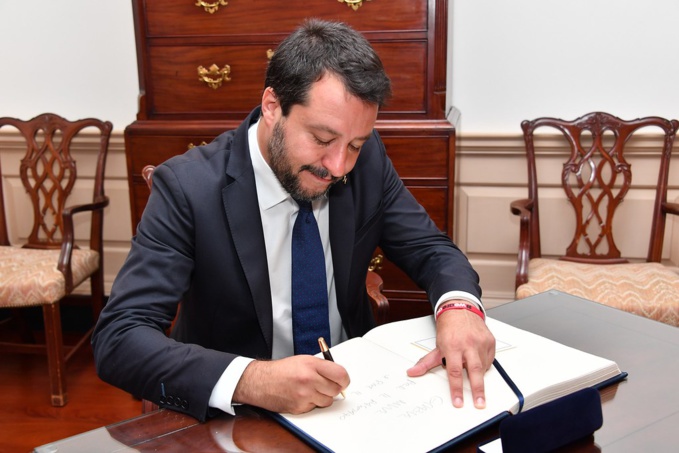A government crisis has erupted In Italy and it seems that the fears of experts are beginning to come true. Apparently, Matteo Salvini, leader of the Lega Nord party, was one of the instigators of the crisis.
He’s got a good excuse: it was a bill on the construction of a railway between Italian Turin and French Lyon. Italy estimates investment in the project at €10 billion. Lega Nord supported it, but the Five Star Movement voted against.
This is not the only key disagreement between Lega Nord and the Five Star Movement. Nevertheless, Salvini clung to it and thus provoked the crisis.
“For eleven months we have been working on laws that serve for the good of Italians. But something has broken in the last two or three months,” Salvini said at a rally in Sabaudia.
According to him, he informed Prime Minister Giuseppe Conte about the situation and suggested "give the floor to the Italians." At the same time, Salvini also threatened to remove the ministers from the cabinet if parliamentary hearings on a vote of no confidence in the government are postponed until next week.
This move was successful. As a result, the Italian Senate will meet on Tuesday, August 13, to determine the date of voting on the issue of a vote of no confidence in the government.
However, many international and Italian experts suggest that calculation of Matteo Salvini may be quite correct. The rating of the illustrious fighter with refugees from Africa, who previously refused to comply with Brussels' requirements and reduce the country's budget deficit, will only increase.
Salvini his Lega Nord will quite possibly win the elections. However, this will lead Italy to an even greater confrontation with Brussels and, in general, to an unpredictable ending for the country.
Judging by the official statistics, the situation in the country's economy does not look the best. GDP growth has almost stopped.
According to the European Commission, Italy's GDP grew by 0.9% in 2018, and according to forecasts, in 2019 the economy will grow by only 0.1%.
Poverty in the country is very alarming. In 2018, 1.8 million households in the country lived in “absolute poverty”, the national statistical agency previously calculated. This amounts to about 5 million people or 8.4% of the population. Also more than 3 million people live in conditions of relative poverty.
At the same time, Italy’s public debt is the second largest in the EU after Greece. The national debt of the country exceeds €2 trillion and amounts to 132% of GDP. According to Brussels, such debt is a significant vulnerability for the economy of the entire euro zone.
The European Commission has already threatened to initiate a disciplinary procedure against Italy. In particular, EC control over budget spending and government borrowing can be tightened and a clear financial framework established that will limit the actions of the national government.
At the same time, a penalty of 1% of GDP, blocking of structural funds and access to the Bank of European Investments may be expected if Italy fails to comply with agreements.
However, Salvini has different priorities than Brussels. It seems that the sanctions do not bother him at all, and he will continue to do what he is doing now. One of his main promises is the costly single tax bill. According to estimates, its adoption can cost the country's budget approximately € 30-40 billion.
At the same time, experts have very pessimistic forecasts about the future of Italy. “We all know that another crisis is coming in Italy, the only question is when will it happen,” Bloomberg agency wrote earlier. “We are moving in a potential default scenario,” says Lorenzo Codogno, founder of LC Macro Advisors.
Italy may very quickly get into a very difficult situation, similar to that in which Greece, Ireland, Portugal, Cyprus found themselves earlier. Then, the country will have to default or ask the EU and IMF for financial assistance, agreeing to their reform demands and austerity under the vigilant control of lenders.
source: independent.co.uk
He’s got a good excuse: it was a bill on the construction of a railway between Italian Turin and French Lyon. Italy estimates investment in the project at €10 billion. Lega Nord supported it, but the Five Star Movement voted against.
This is not the only key disagreement between Lega Nord and the Five Star Movement. Nevertheless, Salvini clung to it and thus provoked the crisis.
“For eleven months we have been working on laws that serve for the good of Italians. But something has broken in the last two or three months,” Salvini said at a rally in Sabaudia.
According to him, he informed Prime Minister Giuseppe Conte about the situation and suggested "give the floor to the Italians." At the same time, Salvini also threatened to remove the ministers from the cabinet if parliamentary hearings on a vote of no confidence in the government are postponed until next week.
This move was successful. As a result, the Italian Senate will meet on Tuesday, August 13, to determine the date of voting on the issue of a vote of no confidence in the government.
However, many international and Italian experts suggest that calculation of Matteo Salvini may be quite correct. The rating of the illustrious fighter with refugees from Africa, who previously refused to comply with Brussels' requirements and reduce the country's budget deficit, will only increase.
Salvini his Lega Nord will quite possibly win the elections. However, this will lead Italy to an even greater confrontation with Brussels and, in general, to an unpredictable ending for the country.
Judging by the official statistics, the situation in the country's economy does not look the best. GDP growth has almost stopped.
According to the European Commission, Italy's GDP grew by 0.9% in 2018, and according to forecasts, in 2019 the economy will grow by only 0.1%.
Poverty in the country is very alarming. In 2018, 1.8 million households in the country lived in “absolute poverty”, the national statistical agency previously calculated. This amounts to about 5 million people or 8.4% of the population. Also more than 3 million people live in conditions of relative poverty.
At the same time, Italy’s public debt is the second largest in the EU after Greece. The national debt of the country exceeds €2 trillion and amounts to 132% of GDP. According to Brussels, such debt is a significant vulnerability for the economy of the entire euro zone.
The European Commission has already threatened to initiate a disciplinary procedure against Italy. In particular, EC control over budget spending and government borrowing can be tightened and a clear financial framework established that will limit the actions of the national government.
At the same time, a penalty of 1% of GDP, blocking of structural funds and access to the Bank of European Investments may be expected if Italy fails to comply with agreements.
However, Salvini has different priorities than Brussels. It seems that the sanctions do not bother him at all, and he will continue to do what he is doing now. One of his main promises is the costly single tax bill. According to estimates, its adoption can cost the country's budget approximately € 30-40 billion.
At the same time, experts have very pessimistic forecasts about the future of Italy. “We all know that another crisis is coming in Italy, the only question is when will it happen,” Bloomberg agency wrote earlier. “We are moving in a potential default scenario,” says Lorenzo Codogno, founder of LC Macro Advisors.
Italy may very quickly get into a very difficult situation, similar to that in which Greece, Ireland, Portugal, Cyprus found themselves earlier. Then, the country will have to default or ask the EU and IMF for financial assistance, agreeing to their reform demands and austerity under the vigilant control of lenders.
source: independent.co.uk



















